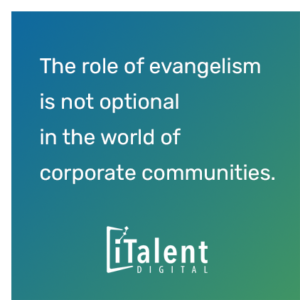Harnessing the power of community evangelism: how it’s like GPT

A clear theme that emerged from The Community Roundtable’s annual report on the State of Community Management was the concept of community evangelism. Specifically, proactive internal community advocacy for the purpose of advancing the community purpose and objective.
In the dynamic landscape of modern enterprises, where connections are digital and collaborations are virtual, the role of an enterprise community manager has the potential to rise in influence.
However, it’s not just about managing the community; it’s about evangelizing its value across the organization. Just like GPT (generative pre-trained transformer) technologies are ushering in a new era of efficiency and scale, the art of evangelism holds the potential to reshape the way we perceive and embrace communities within a corporate ecosystem.
The generative force of evangelism
Much like the potential impacts GPT technologies have on the technology landscape as a whole, the role of evangelism is not optional in the world of corporate communities.
Evangelism goes beyond the confines of community stakeholders; it involves passionately advocating for the community’s significance, weaving a narrative that transcends corporate silos, and driving its adoption across more diverse stakeholder groups.
From management to advocacy
It might be tempting to consider the enterprise community manager’s role as a purely administrative task – a chore to handle the community’s day-to-day operations.
However, akin to the initial skepticism surrounding GPT technologies, the role’s potential often remains underestimated. By evolving from mere management to enthusiastic advocacy, community managers can propel their communities to new heights.
Nurturing buy-in and adoption
 One of the key parallels between GPT technologies and community evangelism is the notion of buy-in. Just as GPT aims to garner acceptance for AI-driven solutions, a community manager must seek buy-in from diverse stakeholders.
One of the key parallels between GPT technologies and community evangelism is the notion of buy-in. Just as GPT aims to garner acceptance for AI-driven solutions, a community manager must seek buy-in from diverse stakeholders.
This involves demonstrating the tangible and specific benefits a community offers – not its potential, but the actual results.
Imagine a scenario where a community manager leverages the art of storytelling to showcase how the community streamlines cross-functional communication.
By illustrating real-world success stories and highlighting how collaboration led to innovative breakthroughs, the manager transforms skeptics into champions of the community cause. Storytelling should be a part of everyone’s job description.
Embracing the yin and yang
The landscape of evangelism has its ups and downs for community managers, much like the relationship between GPT technologies and online spaces. Just as GPT technology faces skeptics, community managers may encounter resistance in their evangelistic efforts.
Skepticism can arise from misperceptions, lack of awareness, or fear of change. However, community managers can tackle skepticism by showcasing tangible returns on investment.
Addressing concerns head-on, providing comprehensive training, and illustrating how the community enhances productivity can convert skeptics into believers. Much like GPT’s transformative capabilities, community managers hold the power to reshape perspectives.
Opportunities in the spotlight
Similar to how GPT technologies present opportunities for online communities, community evangelism unveils a plethora of possibilities for community managers to champion. Let’s explore these transformative opportunities that can reshape corporate landscapes.
SEAMLESS CROSS-FUNCTIONAL COLLABORATION
Much like GPT’s ability to seamlessly connect fragmented information, community managers can foster collaborations that transcend traditional departmental boundaries. By evangelizing the community’s role in enhancing knowledge-sharing and collective problem-solving, managers can establish a dynamic platform for cross-functional synergy.
EMPOWERMENT THROUGH KNOWLEDGE-SHARING
Just as GPT technologies empower users by swiftly delivering relevant information, community managers can empower stakeholders by fostering a culture of knowledge-sharing. Through effective evangelism, managers can emphasize how communities serve as hubs of expertise, equipping employees with the insights they need for informed decision-making.
STRATEGIC INNOVATION ECOSYSTEMS
Just as GPT innovations drive transformation across industries, community managers can cultivate innovation ecosystems within organizations. By evangelizing the community’s potential to incubate ideas, gather diverse perspectives, and catalyze breakthroughs, managers enable a breeding ground for strategic innovation.
Conclusion
As we look toward the future, where the lines between technology and human interactions blur, the parallels between GPT technologies and community evangelism become visible. The power of advocacy, storytelling, and strategic communication stands as the driving force behind elevating enterprise community managers from task-oriented overseers to transformational catalysts.
Just as GPT technologies have left an indelible mark in the online sphere, community managers have the potential to leave an enduring legacy within organizations.
Through the lens of evangelism, they can usher in a new era where communities thrive as dynamic hubs of collaboration, innovation, and collective success. It’s a journey that mirrors the transformative impacts of GPT – shaping the digital landscape and propelling progress into uncharted territories.
Contact us at community@italentdigital.com to speak with us about your enterprise community needs.
You may also like:
5 must-have components of a best-in-class community
How generative AI will impact enterprise community user engagement
Unlock community insights with Khoros Monitor Walls



